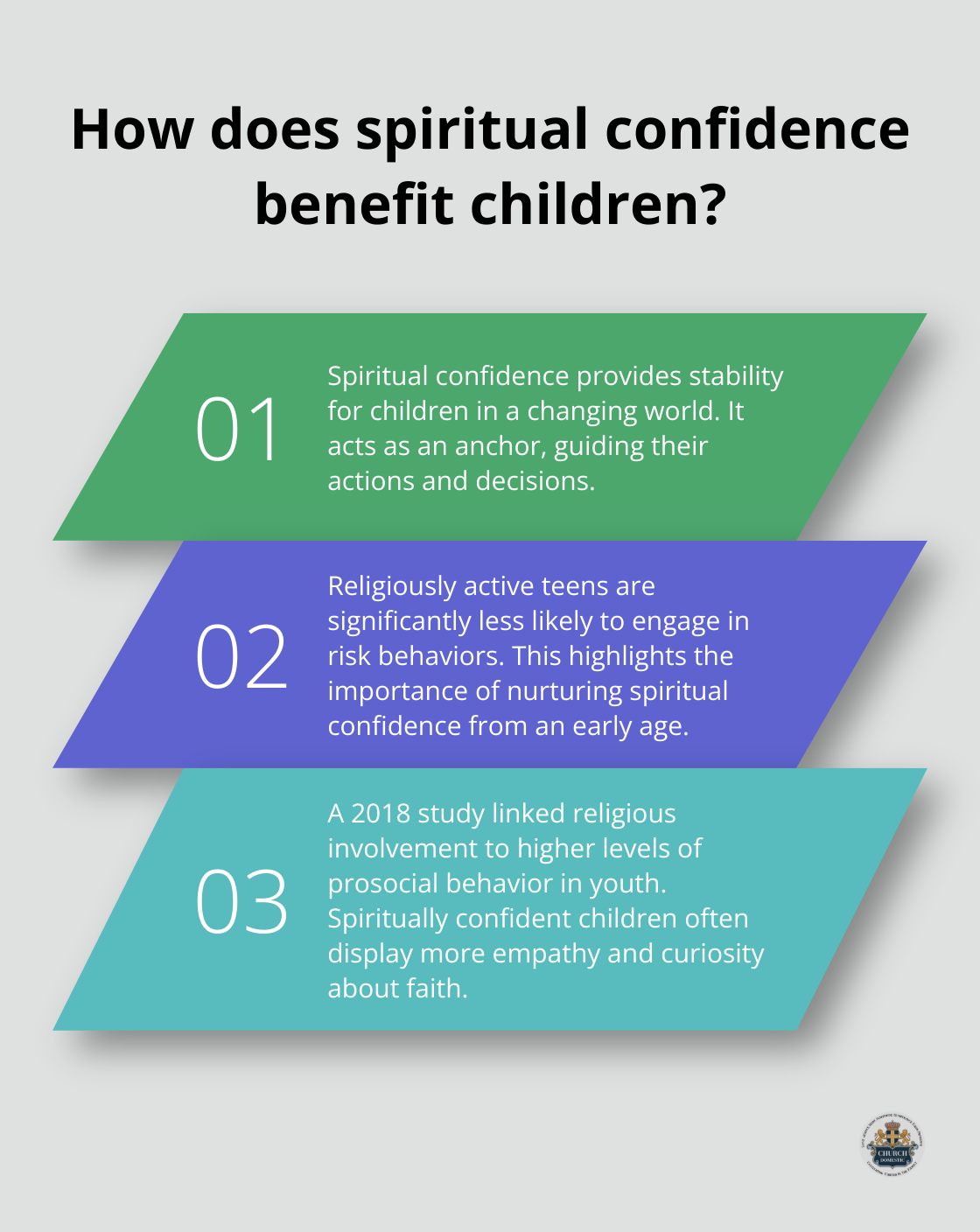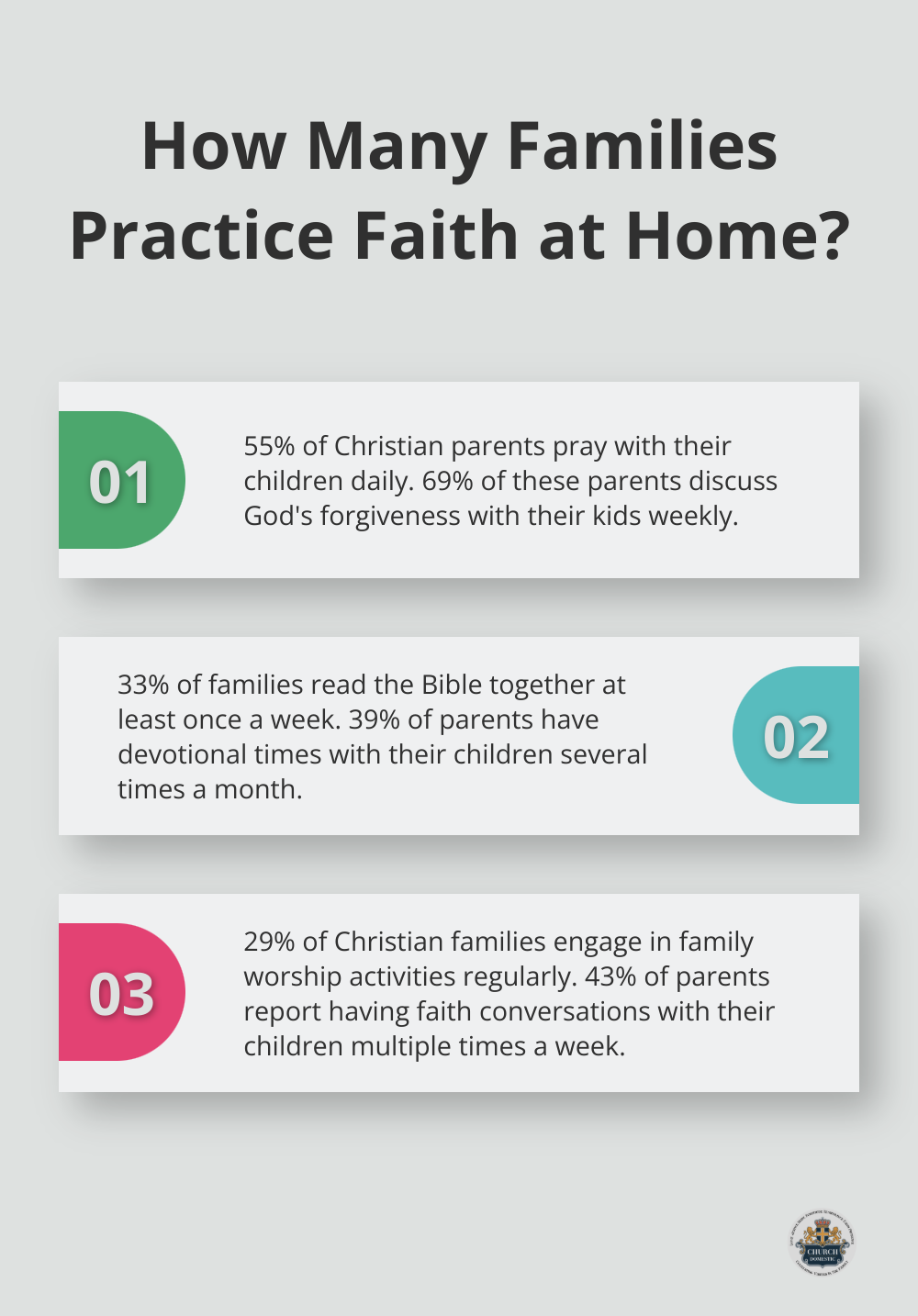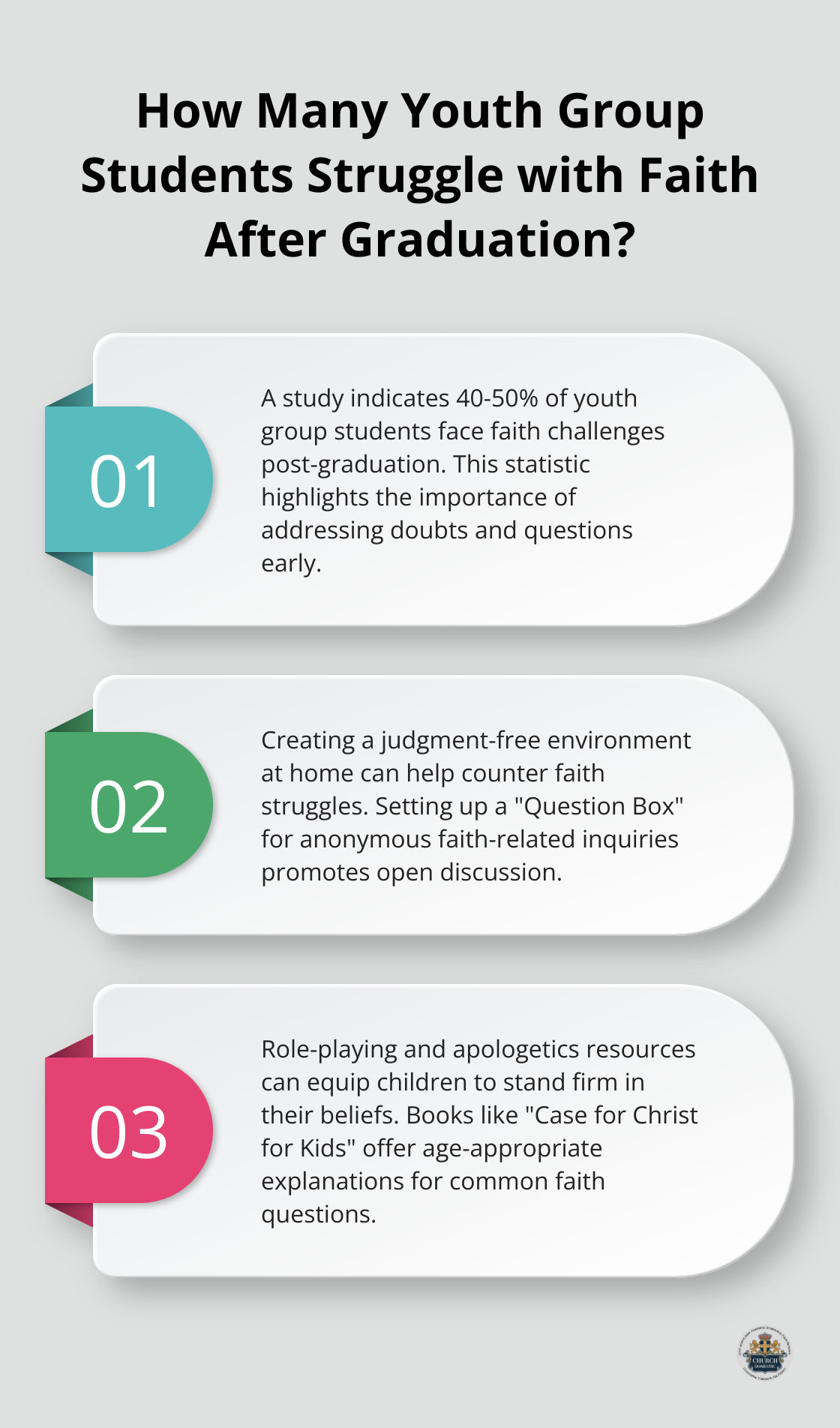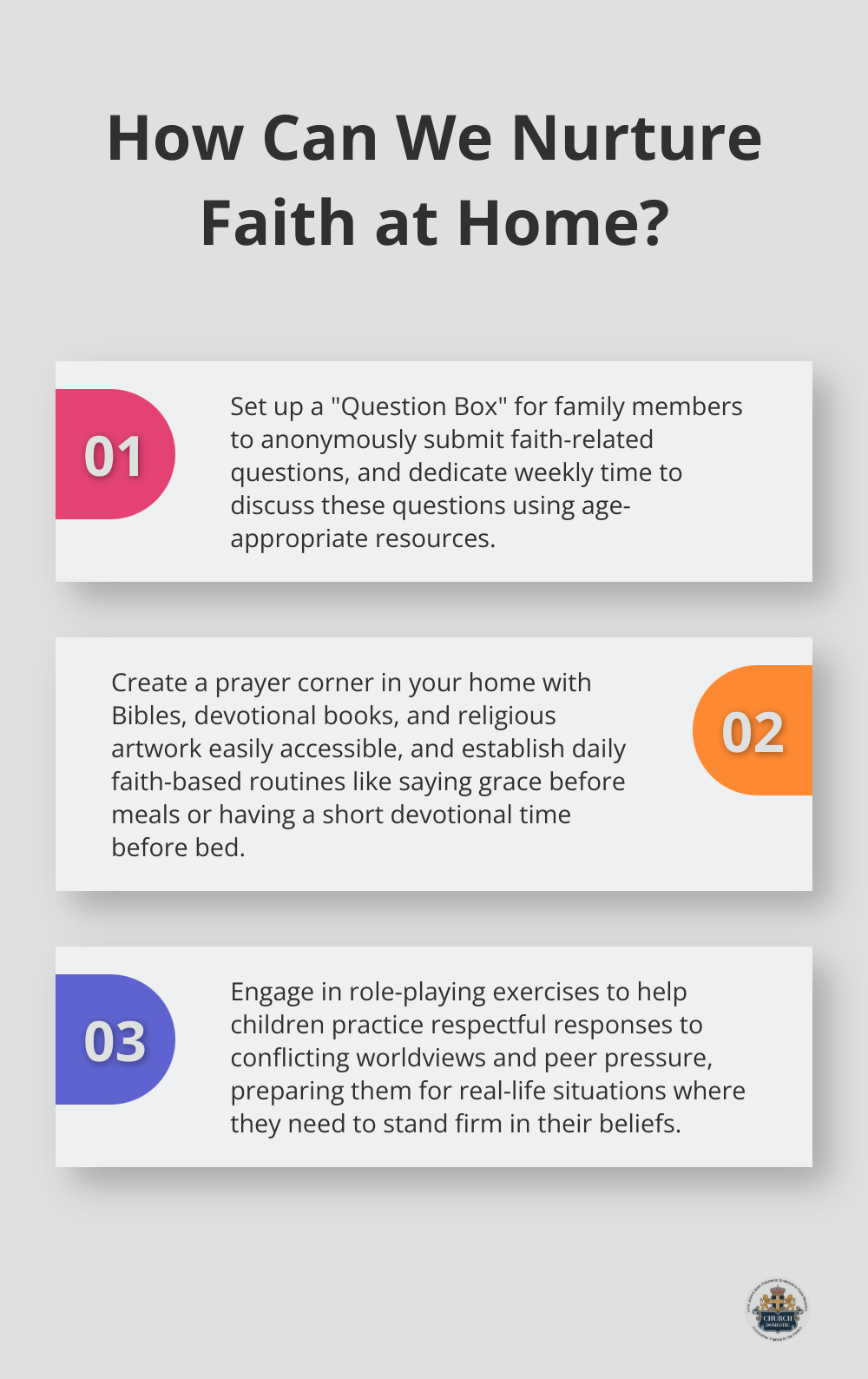At Church Domestic, we understand the importance of spiritual parenting in raising confident, faith-filled children. Many parents wonder if they’re doing enough to nurture their kids’ spiritual growth.
In this post, we’ll explore what spiritual confidence looks like in children and provide practical strategies for fostering it. We’ll also address common challenges and offer guidance on how to overcome them.
What Is Spiritual Confidence in Children?
Spiritual confidence in children extends beyond mere knowledge of religious facts. It encompasses a deep-rooted sense of faith that guides their actions and decisions. Spiritually confident kids exhibit a strong connection to their beliefs, even when faced with challenges.
The Importance of Spiritual Confidence
Spiritual confidence acts as an anchor for children, providing stability in an ever-changing world. A study by the National Study of Youth and Religion found that religiously active teens are significantly less likely than non-religious teens to engage in risk behaviors. This underscores the value of nurturing spiritual confidence from an early age.
Recognizing Spiritual Confidence in Action
Spiritually confident children often display certain characteristics. They ask questions about faith, showing curiosity rather than doubt. They also tend to be more empathetic, with a 2018 study in the journal “Religions” linking religious involvement to higher levels of prosocial behavior in youth.
Fostering Open Dialogue
One key aspect of building spiritual confidence involves creating an environment where children feel safe discussing their beliefs. Dr. Lisa Miller, author of “The Spiritual Child,” emphasizes the importance of open conversations about faith. She suggests that parents who engage in regular spiritual discussions with their children help foster a stronger spiritual foundation.

Parents should initiate these conversations naturally (perhaps during family meals or before bedtime). This consistent engagement helps children develop their own spiritual voice and confidence.
Equipping Children for Spiritual Growth
Spiritual confidence doesn’t require having all the answers. It’s about equipping children with the tools to explore their faith, ask questions, and grow in their beliefs. This approach sets children up for a lifetime of spiritual growth and resilience.
As we move forward, let’s explore practical strategies for nurturing this spiritual confidence in our children’s daily lives.
How to Build a Spiritually Rich Home
Creating a spiritually nurturing environment at home plays a vital role in raising confident kids in faith. Here are practical ways to cultivate spiritual confidence in your children:
Make Faith Visible and Accessible
Start by making faith a visible part of your home. Display religious artwork, keep Bibles and devotional books within easy reach, and create a dedicated prayer corner. Making faith resources readily available sets the stage for organic spiritual conversations and exploration.
Establish Faith-Based Routines
Incorporate faith into your daily routines. This could include saying grace before meals or having a short devotional time before bed. Try using meal times to discuss a Bible verse or share how you’ve seen God work that day.
Create Space for Questions
Encourage your children to ask questions about faith (no matter how challenging). Research insights and practical ideas suggest that helping young people’s doubts and questions can lead them deeper into faith. Set aside time each week for an “Ask Anything” session where no question is off-limits.
Model Authentic Faith
Children learn more from what they see than what they hear. Be transparent about your own faith journey, including your struggles and growth. Share stories of answered prayers or times when your faith was tested.
Engage in Family Worship
Family worship time strengthens spiritual bonds and provides a foundation for children’s faith. This can include reading Scripture together, singing worship songs, or praying as a family. Make these times interactive and age-appropriate to keep children engaged. As you establish these practices, you’ll find that spiritual conversations become more natural and frequent in your home.

Now that we’ve explored ways to create a spiritually rich home environment, let’s examine how to help children navigate challenges to their faith and build resilience in the face of doubt.
Navigating Faith Challenges
Addressing Doubts Head-On
Doubts form a natural part of faith development. When your child expresses uncertainty, don’t dismiss their concerns. View these moments as opportunities for growth. Encourage them to voice their doubts and work together to find answers.

A study suggests that about 40-50% of students in youth groups struggle in their faith after graduation. To counter this, create a judgment-free zone at home where questions are welcome.
Try this: Set up a “Question Box” where family members can anonymously submit faith-related questions. Dedicate time each week to discuss these questions together, using age-appropriate resources to guide your conversations.
Standing Firm Amidst Peer Pressure
As children grow, they’ll encounter conflicting worldviews and face pressure to conform. Equip them with the tools to stand firm in their beliefs while respecting others.
Role-playing can effectively build confidence. Act out scenarios your child might face and practice respectful responses. This prepares them for real-life situations.
For older children, introduce apologetics resources. The book “Case for Christ for Kids” by Lee Strobel offers age-appropriate explanations for common faith questions, helping kids develop a reasoned approach to their beliefs.
Fostering a Personal Relationship with God
While teaching about faith matters, helping children develop a personal relationship with God is equally important. Encourage daily prayer and reflection, tailored to your child’s age and interests.
For younger kids, try prayer journals with prompts like “Today I’m thankful for…” or “God, please help me with…”. Older children might benefit from guided meditation apps (like Pray as You Go), which offer daily reflections and prayers.
Spiritual confidence grows through experience. Create opportunities for your children to put their faith into action through service projects or volunteering. This hands-on approach helps them see the real-world impact of their beliefs.
Embracing Tough Questions
Don’t shy away from difficult topics. Children often have questions about suffering, evil, or apparent contradictions in religious texts. Address these issues honestly, admitting when you don’t have all the answers. This transparency builds trust and shows that faith can withstand scrutiny.
Celebrating Faith Milestones
Mark important moments in your child’s spiritual journey. This could include baptisms, first communions, or personal decisions to follow their faith. These celebrations reinforce the importance of spiritual growth and provide touchstones for future reflection.
Final Thoughts
Spiritual parenting requires dedication, patience, and trust. Small, daily actions often impact children more than grand gestures. Parents should incorporate faith discussions into regular routines, make spiritual resources available, and model authentic faith in their own lives.

Each child develops at their own pace, and parents must meet them where they are. It’s important to celebrate small victories and milestones, recognizing that spiritual confidence builds over time. Parents play a vital role in shaping their children’s spiritual lives, but they must also trust in God’s guidance.
At Church Domestic, we support families in their spiritual journey. We offer resources and insights to help you navigate modern family life while nurturing strong faith foundations. Visit our website for more tips on spiritual parenting and raising confident, faith-filled children.